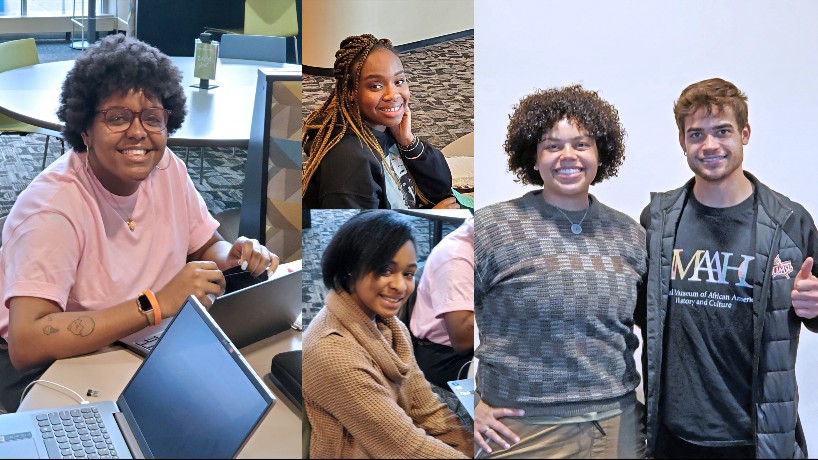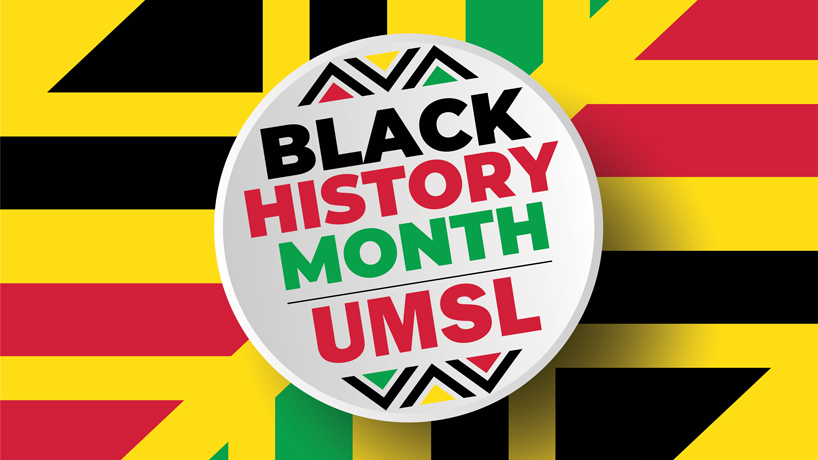
Students (from left) Dejah Mason, Cynthia Okoulatsongo and Krissi Henderson and Ariana Smith and Jake Bain of the LGBTQ+ & Diversity Initiatives of the Office of Student Involvement were among those who gathered Tuesday for the kickoff of Black History Month programming at the Millennium Student Center. (Photo by Wendy Todd)
The University of Missouri–St. Louis has a long history of celebrating Black History Month and providing a variety of events for students, faculty and staff to engage in, learn from and enjoy.
This year’s celebration kicked off Tuesday afternoon with a viewing of the “King Richard“, a biographical account of Richard Williams, father of the tennis stars, Serena and Venus Williams, in the Student Government Association Chamber in the Millennium Student Center.
It was one of several planned events tied to the national Black History Month theme of Black Health and Wellness. This month’s lineup will also feature a discussion about black mental health and trap yoga sessions.
“I’m just so appreciative and excited about what the committee was able to put together this year,” said Ariana Smith, coordinator of LGBTQ+ Initiatives in the Office of Student Involvement. “We have 16 different events on the schedule this month. I think people are just really excited about bringing culture, history and Black excellence to this campus. I think the planning committee has been amazing about pivoting from all the Covid protocols when needed and are honestly excited about bringing some impact to campus.”
Black History Month was first initiated by Carter G. Woodson, a historian and scholar known as the “father of Black history”. In 1926 he set out to designate a period of time where Black history would be highlighted and taught in public schools. He organized the effort with other historians via the Association for the Study of African American Life and History, of which he was president.
It began as “Negro History Week,” had a theme and took place during the second week in February, coinciding with the birthdays of Abraham Lincoln and Frederick Douglass. More than three decades later, the week evolved into what we now know as Black History Month, which President Gerald R. Ford formally recognized nationally in 1976.
The month commemorates Black history, achievement and contribution and is celebrated throughout the country, in organizations and institutions. Kent State University was the first university to observe it.
UMSL students in attendance at Tuesday’s kickoff event shared their thoughts about what Black History Month means to them.
Dejah Mason, who is a junior studying education, appreciates Black History Month as a supplement to her experience growing up that didn’t include many positive examples of the Black experience.
“I grew up in a very mixed racial community so there wasn’t much uplifting, Black representation,” Mason said. “But now it is really cool seeing the history behind everything, what we’ve been through and the important people that have paved the way for our community.”
Cynthia Okoulatsongo, a senior pursuing her BSN in the College of Nursing, has an African background but was raised in Italy. So she appreciates what she lovingly refers to as African History Month as a means to further connect to American history in a way she was unable to while living in a predominantly white environment.
“African History Month is very important to me, especially being in a different country that didn’t have a lot of black culture, ” Okoulatsongo said, “When I came here I didn’t really know much about the people or the civil rights movement. It’s very interesting and cool to see people that look like me, the culture and all this new stuff I didn’t know. My family didn’t really know because they’re not African American. So we need to incorporate that culture in our life too.”
While Black History Month is an opportunity for some to learn and be enriched about history and Black achievement, for many it’s a highlight in an effort to continuously affirm the value of African Americans and the African diaspora in this country.
“Black History Month is everything,” said Krissi Henderson, a sophomore majoring in early education. “You have to have the mindset that it’s every year, every day. It shouldn’t just be one month. It’s about celebrating who we are, what we do and how we want to be – knowing that we’re important. We matter.”















